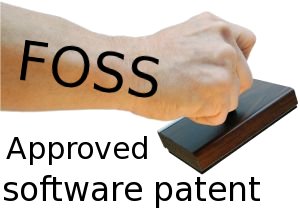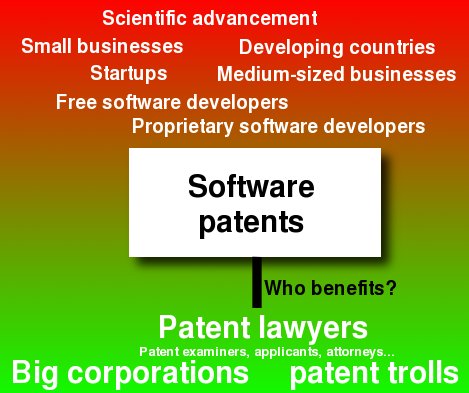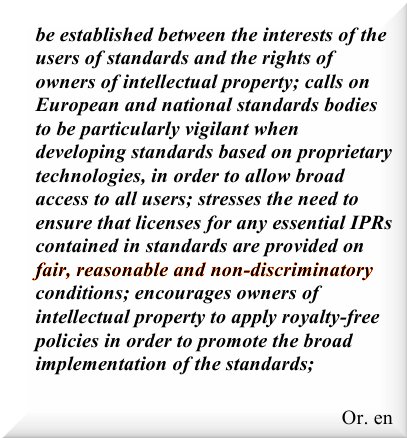10.14.10
Posted in Europe, Free/Libre Software, Microsoft, Patents, RAND, Standard at 9:40 am by Dr. Roy Schestowitz

“SOS,” writes former MEP David Hammerstein, “European Interoperability Framework proposal under fierce attack by MS and M. Barnier Int. Market Commissioner vs. Kroes and citizens.” [Photo by Mara]
Summary: Some real drama is seen in Europe as Microsoft lobbyists have a face-off with representatives of Europe’s real interests, including royalty-free standards
THINGS are getting hot in Europe. As Andy Updegrove has just put it, “If IT Policy is Your Thing, Keep an Eye on Europe”:
[L]et’s take a look at a kerfuffle that emerged yesterday when two lobbying associations reacted to a pre-release copy of the latest version of that extremely interesting and much battered document called the European Interoperability Framework (EIF), version 2.0.
Now, the EIF is a very interesting document, with a long history (you can read more about it here). It’s been around for awhile in version 1.0, and the direction that its next version would take has been hotly debated by large software companies.
At issue, as you might have already guessed, is what EIF does, and does not, say about patents, and more specifically, patents in the context of interoperability standards. Why does it matter? Because the EIF is part of a master plan that will influence how the EU ultimately spends up to the equivalent of $50 billion a year in public IT procurement funds.
This being politics, perhaps it should be no surprise that one of the groups is engaging in over-generalization and misrepresentation, not to mention inaccurate labeling (saying the approach taken in the new EIF draft “echoes” Chinese procurement policy – which in fact has been turning towards more traditional approaches of late).
We already wrote quite extensively about EIFv2. See for example:
- European Interoperability Framework (EIF) Corrupted by Microsoft et al, Its Lobbyists
- Orwellian EIF, Fake Open Source, and Security Implications
- No Sense of Shame Left at Microsoft
- Lobbying Leads to Protest — the FFII and the FSFE Rise in Opposition to Subverted EIF
- IBM and Open Forum Europe Address European Interoperability Framework (EIF) Fiasco
- EIF Scrutinised, ODF Evolves, and Microsoft’s OOXML “Lies” Lead to Backlash from Danish Standards Committee
- Complaints About Perverted EIF Continue to Pile Up
- More Complaints About EIFv2 Abuse and Free Software FUD from General Electric (GE)
- Patents Roundup: Copyrighted SQL Queries, Microsoft Alliance with Company That Attacks F/OSS with Software Patents, Peer-to-Patent in Australia
- Microsoft Under Fire: Open Source Software Thematic Group Complains About EIFv2 Subversion, NHS Software Supplier Under Criminal Investigation
- British MEP Responds to Microsoft Lobby Against EIFv2; Microsoft’s Visible Technologies Infiltrates/Derails Forums Too
- Patents Roundup: Escalations in Europe, SAP Pretense, CCIA Goes Wrong, and IETF Opens Up
- Patents Roundup: Several Defeats for Bad Types of Patents, Apple Risks Embargo, and Microsoft Lobbies Europe Intensely
- Europeans Asked to Stop Microsoft’s Subversion of EIFv2 (European Interoperability Framework Version 2)
- Former Member of European Parliament Describes Microsoft “Coup in Process” in the European Commission
- Microsoft’s Battle to Consume — Not Obliterate — Open Source
There is a big lobbying battle doing on in Brussels, which is the heart of European politics in many ways. Belgium’s Quickenborne plays a role in the ‘community’ patent (bad for the free/open source software community) and we wrote about this in [1, 2, 3]. There’s more in here:
In this situation the compromise proposed by the Belgian Presidency was “not considered sufficient to remove the deadlock”, since it apparenty does not meet any of the above-skeched national interest.
However, the Belgian Presidency is still confident that the next Competitiveness Council in November can find a fair compromise on the EUpatent, as expressed by the Belgian minister in charge of the dossier, Vincent Van Quickenborne, underlining that a compromise is still possible.
This is just one part of the problem which we’ll deal with separately on another occasion. What matters is that Microsoft pressure group Association for Competitive Technology (ACT), which is faking SMB positions as usual, is also pushing for the ‘community’ patent, aka EU patent, aka harmonisation, unification, etc. It’s a trap. Some people fall for it, thinking that the ‘community’ patent is a beneficial thing because they were deceived. And when it comes to EIF, there’s an ongoing conversation and it’s going on at Twitter/Identi.ca, where Carlo Piana (Samba lawyer) says to Karsten Gerloff from the FSFE:
@karsten true #swpats ‘r analized with the eyes of holders (“property”), but economy sh’d research their huge #externality costs
Gerloff responds:
@carlopiana …and for software, patent system’s cost/benefit calculation gives negative result #FSFE
Zuck was there too by the way, according to Gerloff. Have lobbyists not been banned yet?
@carlopiana I confirm. Yesterday at #WIPO, Thomas vs Benoit Mueller and Jonathan Zuck was a treat.
The BSA too is a Microsoft-funded lobbyist and not a representative of European interests. Microsoft has been using the BSA to lobby for RAND in Europe for at least a couple of years. CompTIA has been absent from Microsoft’s ranks of lobbyists in Europe recently, but it was there before (pushing Microsoft’s side in EIF drafts).
David Hammerstein, a former member of parliament who occasionally shares information about Microsoft’s lobbying inside the Commission [1, 2], is now saying: “SOS: European Interoperability Framework proposal under fierce attack by MS and M. Barnier Int. Market Commissioner vs. Kroes and citizens.”
Microsoft is betting on patents as its weapon against software freedom and here’s another new footstep which we mentioned yesterday. Patents seem like this company’s last resort.
For those who want to know more about Microsoft’s ‘RAND fight’ against competition, there’s a new transcript from the FSFE’s Gerloff. “Delivered FSFE statement on #swpat at #WIPO #SCP15, will post shortly. Very good reactions from some states. EPO not so happy,” wrote Gerloff. Quoting a portion of it:
Some argue that the inclusion of standards in patents on RAND terms is a necessary incentive for companies to innovate. Free Software Foundation Europe begs to differ. We join the Development Agenda Group in highlighting that the monopoly power conferred by a patent is exponentially increased when the patent is included in a standard.
If a company has been awarded a patent, it has already received a strong incentive to innovate, in the form of a 20-year monopoly on the use of the invention, to the exclusion of all others. Why should society incur a further, even more substantial cost by handing this patent holder a means to effectively control competition in the marketplace, by letting it control the price of a patent license?
Today’s software market is already rife with monopolies and dominant companies in several domains. It should be the goal of norm-setting efforts to reduce the obstacles to competition in the software market, rather than increasing them.
FSFE believes that it would be most useful for the SCP to analyse the various approaches on the grounds of their inclusiveness of the entire IT industry and all innovators, and identify the minimum requirements that are necessary to uphold standards as drivers of competition, innovation and economies of scale.
We also recommend that in its deliberations, this committee should be careful to distinguish between different areas for standardisation, as the requirements in each area are quite diverse.
Let’s keep shining a light in the face of lobbyists. They don’t like it when people find out who’s paying their bill; it delegitimises them and they deserve it. Europe deserves it. █
Permalink
 Send this to a friend
Send this to a friend
Posted in Apple, Deception, Free/Libre Software, GNU/Linux, Patents at 8:45 am by Dr. Roy Schestowitz

Summary: News about initiatives and companies that under the guise or true intention of promoting Free software actually promote proprietary software and software patents (with Microsoft “patent tax”)
EVERY NOW AND THEN we politely name those players in the industry whose actions contribute to software patent entanglements and thus barriers to software freedom. The intention is not to provoke but rather to inform. So today we’ll start by naming Peer-To-Patent again. It’s hard to criticise the project, which takes a ‘pragmatic’ approach and has some inter-personal roots in Linux-friendly companies; we — as well as others whose approach is similar — have been critics of Peer-To-Patent because it is promoting “good” software patents, albeit passively. Groklaw seems to like Peer-To-Patent and their staff is always sending us E-mail, however we — along with others like FFII and TechDirt — are rather sceptical because valuable time of volunteers is being spent gardening the work of people who applied for patent monopolies on software. TechDirt says that Peer-To-Patent may be coming back; it’s better than nothing at all, but there may be better ways (also better than OIN) to eliminate the problem. TechDirt starts by stating:
We’ve been a bit critical of the Peer-to-Patent program that was tested in the US a couple years ago. The idea — which I appreciate — was that certain patent applications would be opened up in a “crowdsourcing”-style, for the wider community to provide evidence of prior art. My problem with it wasn’t the concept of involving others, but the idea that prior review during the application process would really be all that meaningful or useful in the long run. That’s because it’s often tough to get the necessary people to care about a bad patent or bad patent application until it’s being used against them. So the incentives to keep swatting down bad patents just isn’t that exciting. Second, the worst of the bad patents are ones that are asserted later, for something that seems completely different or unexpected, but which the patent holder claims violates their patent. It’s tough to predict that ahead of time. Finally, the program only focused on prior art, not obviousness, which is an even bigger issue.
Yes, you could argue that such a peer review system wouldn’t hurt, but it often felt like the program’s backers thought it would solve most of the problems of the patent system, where I can only see it maybe helping out at the margins. That’s why we weren’t surprised at all to find out that the program had quitely shut down last year and almost no one had noticed.
Another player which is hard for us to criticise is Tuxera, which actually did bring some invaluable software to Linux (NTFS) before it signed a deal with Microsoft and started selling software patent licences rather than just software. Well, Tuxera’s NTFS is coming to Macs now. It’s not entirely clear what role Microsoft plays in it (if any) now that these companies are together in a patent bed.
There is another company called Likewise which helps sell Microsoft UNIX/Linux patent licences (Active Directory and the likes of it). Likewise uses the latest release of Ubuntu to sell its patent ploy again [1, 2], taking advantage of users who are not already familiar with Samba. “Likewise Integrates Alien Systems with Microsoft Active Directory” says this resultant article. For those who do not know, Likewise has roots in Microsoft and so does Black Duck, whose CEO will become part of an “open source” think tank (even though Black Duck is a proprietary software company). Black Duck is located next to Novell’s headquarters and not far from Microsoft’s other attempts to harm GNU/Linux from the inside (Cambridge labs), by means of fusion with software patents. To quote a new article:
Black Duck CEO Yeaton joins China open-source think tank
Waltham-based Black Duck Software announced last week that it had acquired open-source online resource Ohloh.net, an online directory of open-source-related software and people.
Ohloh is not open source, either. Like Black Duck, it only takes advantage of open source, just in the data sense. The products themselves are proprietary, but the data they get applied to is free/open source software source code.
“Apple is now devising software patents as path to an exclusive censorship mechanism.”Another company which loves to pretend that it is an “open source” player is Apple, even though software patents are a high priority at Apple and the latest outrageous patent raises a brow and makes many headlines (e.g. [1, 2, 3, 4]). To quote one article: “Apple has just been awarded a patent for what people are already calling ‘anti-sexting’ software.”
It’s still about restrictions at Apple because Apple knows best and it wishes to impose its beliefs/preferences on customers. Jobs has already spoken about “freedom from porn” and that’s a classic example of where freedom comes to mean the exact opposite. Orwell once warned: “Don’t you see that the whole aim of Newspeak is to narrow the range of thought? In the end we shall make thoughtcrime literally impossible, because there will be no words in which to express it.”
Apple is now devising software patents as path to an exclusive censorship mechanism. Does society need restraint to be imposed by gadgets? Need it be a monopoly, too? █
Permalink
 Send this to a friend
Send this to a friend
Posted in Free/Libre Software, FUD, GNU/Linux, Microsoft, OpenDocument, OpenOffice, Oracle, Videos, Windows at 7:09 am by Dr. Roy Schestowitz
Like the scorpion and the tortoise

Summary: Additional proof that the “Open Source” policy at Microsoft is still something along the lines of “We are not allowed to be seen as attacking Free software but quietly we have to”
THE RECENT REMARK from Hernán Rincón (insulting “Open Source” [1, 2, 3], which gets adopted widely where he works for Microsoft around Brazil) have helped a lot of people see that Microsoft it no friend of “Open Source”, but this does not prevent Microsoft from carrying on with this PR charade. Microsoft’s booster Marius Oiaga is helping them right now:
Microsoft, once the anti-open source poster child, says that the company has evolved as the world changed and that it is now committed to openness.
Watch them use their beloved Novell to spread this lie:
Microsoft made a critical move in 2006, when it inked a Windows and Linux interoperability alliance with open source vendor Novell.
Since then, both Microsoft and Novell have made investments into making sure that Windows Server and SUSE Linux can play nice together for customers that need to run both platforms in their heterogeneous environments.
Let’s face it, Microsoft’s biggest cash cow is suffering (that’s Office) and while Microsoft keeps pretending to harbour “open source” on Windows it is actually attacking OpenOffice.org for Windows, even though it’s “open source” and for Windows. What does that say about Microsoft’s attitude towards “open source” on any platform at all?
Microsoft’s hiring of people specifically to fight OpenOffice.org (and LibreOffice or Lotus, by extension) is something that we covered before [1, 2]. It has turned rather pathetic. Microsoft is now blatantly lying in new videos. “Source of one of the quotes in #MSFTvOOo video,” says Jan from Red Hat, is a case “from 2006(!) about Windows 2003(!)” (he also gave a pointer to Microsoft.com). Someone who prefers to remain anonymous has chosen to study Microsoft’s ‘beef’ in this latest FUD campaign and here is what he or she found, based on this video:
The people quoted in the spot against OpenOffice:
James Fleming, Infrastructure and Support Manager, Speedy Hire
Jeff Cimmerer, Director of Technology for the Pittsford School District
David Sterling, ICT Manager, Central Scotland Police
Bülent Türker, Product Manager, Scarves Department, SARAR Group
Eugene Mariotto, ICT Director, Cobra Automotive Technologies
Eros Borgogelli, Information Systems Coordinator, Ciar
Randall C Kennedy, InfoWorld
Tisome Nugent, Educator, Orange County Public Schools
Sergey Sakharov, Business Process Optimization Manager, Art of Transport Logistics
Darek Muraszko, Information Systems Admninistrator, Kaczmarski Inkasso
Igor Gentosh, Head of System Integration Department, Kredobank JSC
Tiziano Battilana, Information Systems Coordinator, Euromobil Group
Joerg Lenze, System Administrator, Heinrich Berndes Haushaltstechnik GmbH & Co. KG
Leonid Medvediev, Head of IT Department, CJSC SPC, BorschagivskiyChemical and Pharmaceutical Plant
Bailey Mitchell, Chief Information Officer, Forsyth County Schools
I am in the process of checking the quotes and I have noticed they are effectively taken from quite old “success” stories, here some examples:
David Sterling, ICT Manager, Central Scotland Police
Source of the quotes:
http://www.microsoft.com/casestudies/Microsoft-Office-2003/Central-Scotland-Police/Central-Scotland-Police-Cuts-Maintenance-Costs-30-Percent-By-Replacing-Linux-Desktop/49609
This is a “success” story of 2006 about a migration to Office 2003/Windows 2003. Linux desktops in 2003 and OpenOffice in 2003 are ancient IMHO, not really a good way to convince customers NOW 
You can find more, for example:
Tisome Nugent, Educator, Orange County Public Schools
http://www.microsoft.com/casestudies/Case_Study_Detail.aspx?casestudyid=4000005095
Joerg Lenze, System Administrator, Heinrich Berndes Haushaltstechnik GmbH & Co. KG
http://65.55.21.250/caseStudies/Case_Study_Detail.aspx?casestudyid=4000006523
Etc. etc.
All you will find are arguments on how the lock-in of Microsoft Office makes sure noone can switch to alternatives.
Decide for yourself 
Here is some coverage about Microsoft’s latest steps (the video is said to have been removed/gone private, probably for PR/damage control reasons):
-
Microsoft has a long-established practice of disarming competition by not acknowledging it, because acknowledging the competition gives it power. Well, the Redmond giant has changed stance when it comes to OpenOffice and launched a video attack on the free alternative to the Office software suite.
-
A few hours after this story was published, Microsoft set the video as “private,” meaning it can no longer be viewed by the public. We found it hosted on Microsoft.com, however, so if you have Silverlight, go watch it there.
-
Educational organizations get locked-in and so do students. What happens if a student goes to work at a place that uses OpenOffice.org on GNU/Linux? Are they doomed? Nonsense. It’s a GUI and they point, click and type. For a school district to spend $millions annually on software they can do without should be a crime or at least a breach of fiduciary responsibility to use the tax payers’ money wisely. What does it teach a kid that his school spends more on software that they don’t need when the system has to be cut back somewhere else because the premise of the whole situation was that the budget was tight? Do you think they might have to cut something that does educate students, Homer?
Oh! The Horror! The Horror of educational systems that cannot do the maths. There are thousands of systems that have deployed OpenOffice.org and GNU/Linux with no problems except what to do with the savings.
-
In due course, more details emerged of how Mindcraft had been able to draw directly on support from Microsoft when tuning the system, but had not involved Red Hat, whose distribution was being used for the tests, in the same way. This meant that several important tweaks that would have improved the latter’s performance were lacking. Indeed, it later turned out that the tests had actually been conducted in a Microsoft laboratory.
[...]
It seems that Microsoft has forgotten this important lesson. For it has put together a three-minute video of customers explaining why they switched from OpenOffice.org to Microsoft Office.
The criticisms made in the video are not really the point – they are mostly about OpenOffice.org not being a 100% clone of Microsoft Office, and compatibility problems with Microsoft’s proprietary formats. The key issue is the exactly the same as it was for the Mindcraft benchmarks. You don’t compare a rival’s product with your own if it is not comparable. And you don’t make this kind of attack video unless you are really, really worried about the growing success of a competitor.
Just as it did in 1999 for GNU/Linux, Apache and Samba, the company has now clearly announced that OpenOffice.org is a serious rival to Microsoft Office, and should be seriously considered by anyone using the latter.
Thanks Microsoft.
-
OpenOffice
The most popular open source office solution is OpenOffice, original released as an office suite for Linux but later released for Windows.
OpenOffice features the Writer, Calc, Impress and Base applications for word processing, spreadsheets, presentations and database management, all free, while technical support is provided in the form of help documents on the website and a directory of consultants, although this last option is intended only for businesses. OpenOffice is available from download.openoffice.org.
Note that in the near future, OpenOffice will be available as LibreOffice.
Oracle Open Office
If Open Office appeals to you but you require online support, then Oracle Open Office might be your best choice. Offering the same functionality as OpenOffice, Oracle Open Office is available to purchase from www.oracle.com as an enterprise-class office suite based on the same open standards as OpenOffice.
-
Regarding that last one (a press release), the Microsoft booster just had to say something negative:
Oracle is spinning its participation in a forthcoming Open Document Format (ODF) event as proof of its continued commitment to the OpenOffice.org community.
Gavin seems to be the one spinning, not Oracle. He too seems interested in hurting OpenOffice.org, so it’s not just Microsoft which does it very publicly right now. If it hurts Microsoft, it means we need more of the same. It’s an indication of weakness. █
Permalink
 Send this to a friend
Send this to a friend
10.13.10
Posted in Free/Libre Software, Microsoft, Oracle, Patents at 2:07 am by Dr. Roy Schestowitz

Summary: Today’s proof that software patents are the enabler of the monopolist, the troll, the patent attorney who serves them (Gene Quinn being awfully abrasive in this case), and that’s about it
AN aggressive patent strategy is what's left at Microsoft because, according to a new survey shared here last night and this morning, “businesses are moving to Linux far faster than they are to Windows or Unix.” Some years ago Microsoft funded a copyright lawsuit against Linux — a challenge that fell flat on its face but bought Microsoft some more time. Well, time’s up and as Microsoft takes on debt it is also building a patent portfolio rather than decent products. Microsoft has just been awarded a patent for graphics chip video encoding, according to a new report:
Companies ranging from Microsoft, Apple, AMD, and Nvidia have all worked for years to tap into graphics cards for certain kinds of non-gaming processing tasks, an approach typically referred to as GPU computing. Growing ever more prevalent, GPU computing has made its way to Web browsers, Photoshop, as well as both recent versions of Apple’s and Microsoft’s operating systems. That’s why we were so surprised by ConceivablyTech’s report today that Microsoft has been awarded a patent for GPU-Accelerated video encoding.
This new press release from Acacia — like other new ones of its kind — indicates an expansion of a counter-productive agenda. It only helps create a landscape where original lines of code are said to be “infringing”.
Well, Patent WatchTroll currently scares and warns fellow software patents proponents (probably patent lawyers who act as middlemen in this system) that “open source” does not like such patents. Microsoft knows this too, which is precisely why it promotes them (while pretending to have embraced “open source”).
Oracle is another reason for concern because it uses software patents for control. According to this article, Oracle’s CEO has said: “we are interested in buying IP of all kinds”
Ellison made the comments in response to a shareholder question about his remarks last month during Oracle’s financial analyst meeting. At that time, Ellison said, “You could see us buy a chip company.”
“My point really was that we are interested in buying intellectual property of all kinds,” Ellison said at the Wednesday meeting at Oracle’s headquarters in Redwood Shores, Calif., indicating that his remarks had set off a lot of speculation.
Oracle opposed software patents many years ago. Has anything changed since then? Well, in any event, let’s keep on eye on those who promote and use (e.g. sue or sell) software patents, which seem like the last barrier stopping Free software from spreading to a state of ubiquity everywhere (Linux and Apache, for example, already succeed in their respective areas). █
Permalink
 Send this to a friend
Send this to a friend
10.12.10
Posted in Europe, Free/Libre Software, Patents, RAND, Standard at 10:00 am by Dr. Roy Schestowitz

Summary: Links and succinct analysis of forces in Europe which promote or help promote software patents, impeding its original agenda in the process (sometimes for multinationals to capitalise on)
PROPONENTS of software patents in Europe rear their heads again and in order for their influence to be diffused/defused (generally dismantled) we will show who they are and what ideas they are promoting. First of all, up goes the Belgian EU Presidency again. We wrote about its positions very recently, under the assumption that Quickenborne plays a key role [1, 2]. According to this report, the Presidency is still pushing for the European Patent, which may enable software patenting through the back door.
Meanwhile, it has been reported that the current Belgian EU Presidency seeks a break-trough in the negotiations for the EU patent and the unified European Patent Court by a non-paper put on the table at the informal Competitiveness Council of 29 September 2010.
The non-paper suggests an alternative language regime to overcome the opposition of especially Spain and Italy, which are the most vocal critics of the Commission’s latest proposal. According to the compromise of the Belgian Presidency, English French and German would remain the official languages for filing EU patents, while English would be the only language into which patents are translated, however, only for a transitional period until the performances of translation machines have reached a sufficient level.
Alexander Spuntz says:
EU Commission presents “Innovation Union” Initiative as Belgian Presidency seeks Break-Through in EEUPC Language Issue: http://bit.ly/dv4kf1
Now we come to the reaction of the FSFE, whose opinions on matters of patenting are similar to the FFII’s (both are based around Germany). The head of the FSFE writes:
Asked #WIPO #SCP15 why study http://ur1.ca/215on discusses EPO’s granting of #swpat, but doesn’t mention this is illegal under EPC Art 52
Separately, said the head of the FSFE, “BSA Mueller [claims that] standardisation policy shouldn’t take sides re business models. I agree – standards should be implementable OS/FS”
This goes back to what the BSA did in London last month. BSA lobbying for software patents (through RAND) in Europe goes years back and we have a wiki index documenting some incidents. According to this, there is some good news though; the European Union nearly chooses to ban RAND/FRAND, so lobbyists like BSA use the “red” smear which the FFII is already laughing about. It’s like they try to compare API access to communism. What pathetic and disrespectful tactics.
The European Union is on the cusp of writing public procurement rules which favour patent- and royalty-free technologies, according to software giants who argue that the rules echo Chinese public procurement laws.
[...]
As the FFII puts it:
#BSA worried #EIF would “give technologies that have open specifications an advantage in public sector bids.” #lol http://bit.ly/bFyV29
Glyn Moody has responded with the article “Whatever the BSA Says, FRAND is no Friend of Europe”. He compares this to the World Wide Web.
The European Commission is therefore quite right to follow the W3C when drawing up modern standards for the 21st century, rather than being held back by older approaches that were drawn up for quite a different world. Let’s hope the Commission is not led astray by the BSA’s special pleading for the unfair and inefficient FRAND, which is most certainly not a friend of Europe in this case.
One ought to remember that Microsoft funds the BSA. So does Novell. █
Permalink
 Send this to a friend
Send this to a friend
Posted in Free/Libre Software, Microsoft, SCO at 9:00 am by Dr. Roy Schestowitz

Summary: Matt Rosoff leaves Directions on Microsoft and a 22-year veteran (Brad Lovering) also abandons the sinking ship, which now suffers turbulence in the Interactive Entertainment Business and renames things as a miserable last resort (seven-washing and the like)
Microsoft is like SCO some time around 2004. It has already sued companies over Linux (since last year) and this was not properly challenged in court. Its own products are a hard sale and increasingly fewer (many get cancelled due to budgetary constraints) while competition leapfrogs it technically, although it still has some momentum remaining due to existing deployments, as well as size which decreases.
According to two Microsoft boosters [1, 2], the Technical Fellow Brad Lovering is quitting and a peripheral Microsoft booster called "Directions on Microsoft" has just lost a key person (it’s a small company) whom we wrote about before since he promotes Microsoft at CNET. That would be Matt Rosoff.
“Microsoft should rename itself “Microsoft 7″ and see if that works.”In addition to this, Microsoft’s Interactive Entertainment Business gets “re-orged” (euphemism to use when many people quit or get laid off) and its failed attempt to undermine the Free software community gets renamed [1, 2, 3] to “Outercurve”. None of these are good signs in a company that lost direction. “A rose by any other name,” writes Groklaw, “but I wonder if Microsoft and curve in the same thought is helpful?”
Microsoft should rename itself “Microsoft 7″ and see if that works. Sometimes it does. As stated on Sunday, we no longer track Microsoft as closely as we once did for the same reasons we are no longer called “Boycott Novell” and Groklaw is no longer just about SCO. Threats to software freedom change all the time and Techrights is not fixated on any particular company, unless that company really does a lot to attack software freedom. Microsoft’s attacks are becoming as pathetic as SCO's due to inability to compete technically. █
Permalink
 Send this to a friend
Send this to a friend
10.08.10
Posted in Europe, Free/Libre Software, GPL, Microsoft, Patents, RAND at 8:15 am by Dr. Roy Schestowitz

Summary: RAND is found in the European Parliament (EP) draft on the “future of European standardisation”
A draft report [PDF] from Edvard Kožušník was produced for the European Parliament and it sure has room for improvement. This paper on the future of European standardisation contains some elements which may exclude Free software (as defined in terms of the GPL, the most ubiquitous software licence).
“This paper on the future of European standardisation contains some elements which may exclude free software (as defined in terms of the GPL, the most ubiquitous software licence).”In page 63 we have the text which speaks of “the need to ensure that licenses for any essential IPRs contained in standards are provided on fair, reasonable and non-discriminatory conditions” and that’s just a euphemism for patent tax.
It was only last night that we explained how Microsoft lobbyists and mobbyists were promoting RAND in Europe and the Open Web Foundation, partly staffed by Microsoft, has also included the RAND problem within its boundaries. It’s crucial not to let this be. It’s a way of illegalising software freedom and the European Commission fell for it [1, 2, 3, 4]. █
Permalink
 Send this to a friend
Send this to a friend
Posted in Deception, Free/Libre Software, Microsoft at 7:38 am by Dr. Roy Schestowitz

Summary: Nu is not GNU; Microsoft is just openwashing (making something only appear more open), addressing perception issues around yet another part of its proprietary stack
Microsoft really tries to make itself appear “open”; the monopolist is by no means opening up or embracing freedom, it’s only trying to change public perception, most recently by renaming [1, 2].
These desperate moves (NuPack being the latest) are not going to fool Free software supporters, but they sure managed to get some attention from news sites, especially those which are run by Microsoft boosters [1, 2, 3, 4] or sympathisers [1, 2], and a couple of exceptions [1, 2]. It is especially funny how the Microsoft boosters try to make it seem like Outercurve and Microsoft are separate. What a great example of lousy reporting. This is why Microsoft grooms particular people, who eventually become an extended family of the PR department. NuPack is just about selling .NET and Windows, i.e. proprietary, highly-restrictive software. Katherine Noyes has just published this article which explains “Why Windows Is Bad for Business” and to quote one fragment:
Microsoft is also very good at suggesting that Windows malware is an industry problem rather than one that’s a direct result of its own lax security.
The fact is, there are few users in this world who choose Windows because it’s irresistibly good. Rather, most use it because of inertia, pure and simple. For that inertia, however, everyone pays a price–especially organizations. Here’s why Windows is undeniably bad for business.
Microsoft is busy trying to pretend that its proprietary stack is somehow open and thus equal/on par with GNU/Linux. It’s a lie, it’s openwashing. █
Permalink
 Send this to a friend
Send this to a friend
« Previous Page — « Previous entries « Previous Page · Next Page » Next entries » — Next Page »

























 Content is available under CC-BY-SA
Content is available under CC-BY-SA